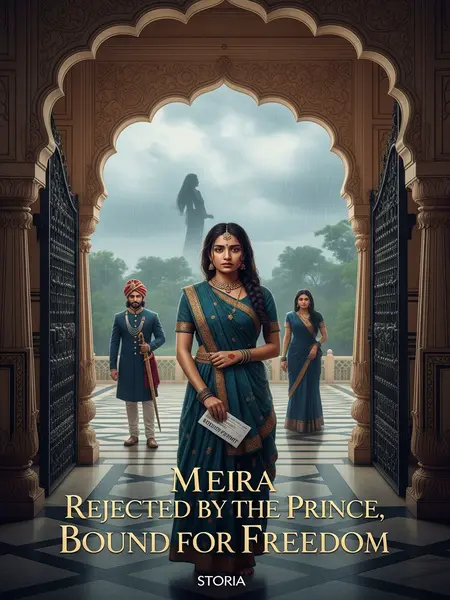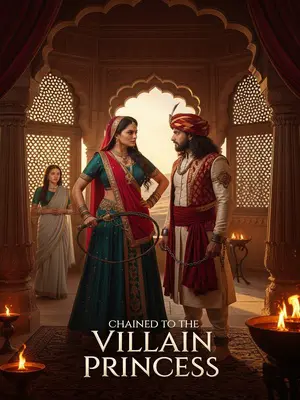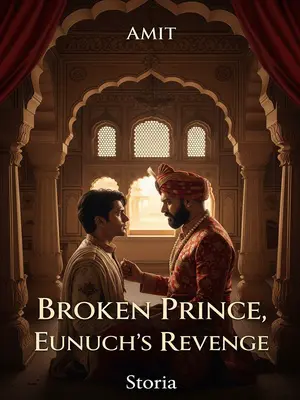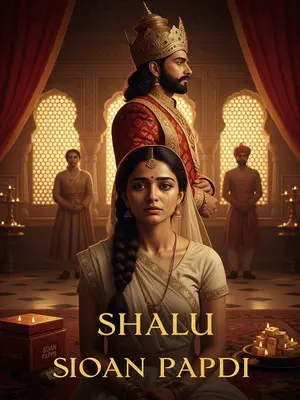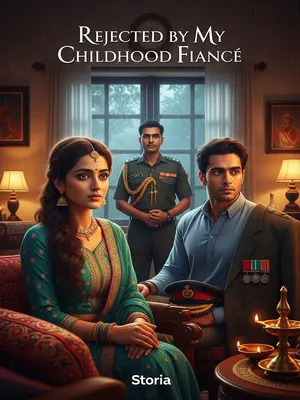Chapter 2: The Fracture
I was carrying parathas home.
The paper bag was warm, the aroma of ghee and aloo mixing with the sweet scent of raat ki rani from a neighbour’s verandah. I’d made extra, hoping to feed Arjun before his evening classes. My slippers slapped on the stone steps as I hurried up.
Arjun was just opening the door to leave.
He turned, surprise flickering across his brow. The awkward way he held the brass handle made me pause, as if I’d caught him mid-thought.
The faded blue kurta was gone; he wore a silk sherwani now, hair neatly combed, a new air of pride about him.
I barely recognized the man I’d nursed through fever, now standing straight, zari glinting at his cuffs in the evening sun. Something in his posture had changed—no more slouch, no more shuffle. He looked like someone who’d remembered his own worth.
I had just learned he was the fifth son of the royal family, his name cleared, and the Raja had summoned him back to Delhi.
Neighbours still whispered: “Who knew he was royalty, re? No wonder he carried himself with so much pride!” Even the postman’s hands had trembled when delivering the Raja’s summons.
The one who came to fetch him was his fiancée from Delhi.
She waited a step behind, eyes rimmed red but chin held high. The gold embroidery on her dupatta caught the light—a silent proclamation of her place in a world that had no room for girls like me.
I had never known.
A small, incredulous laugh almost escaped me. Through hunger and hardship, he’d never told me. Secrets, it seemed, were stitched into the seams of his life.
Priya stood behind him, elegant and dignified, tears shimmering in her eyes.
She looked at me with a sorrow that felt like pity, the way one looks at a stray kitten. Her presence filled the small hallway, the air thick with words unsaid.
Arjun took a step forward, his voice cold:
“Kaveripur, sirf wohi rani ban sakti hai jo hamare khandaan ki payal pehene. Humari shaadi ka koi matlab nahi.”
His words stung like mirchi in a fresh cut. The ceiling fan rattled above, its sound suddenly too loud. From a neighbour’s window, an old Lata Mangeshkar song floated in, its plaintive melody settling into my bones.
“Priya ne do saal intezaar kiya hai. Woh tumhe dusri patni ka darja dene ko tayyar hai—uske liye yeh bhi badi baat hai.”
My hands clenched. Was this mercy? Memories rushed in: sleepless nights, fevered prayers, hope clung to in the darkness.
“Jaldi tayyar ho jao. Kuch din mein Dilli nikalna hai.”
His words were commands, not requests. I felt like a bundle of clothes, ready to be moved. The world outside faded; only his authority echoed in the room.
My gaze fell on their interlocked fingers.
Her gold ring glinted, his thumb tracing it. The intimacy twisted my stomach. My place had never been beside him.
He was eager to prove himself to Priya, to display her before the world.
In our world, the izzat of the legitimate wife is everything. His need to show loyalty to her, even at my cost, was a ritual sacrifice.
His affection for Priya, their mutual devotion—all the tenderness he’d never shown me.
It was as if every drop of warmth I’d waited for was reserved for someone else. My hands shook, but I willed myself not to drop the parathas. Even now, my mind ran to spilled food, not my own heartbreak.
He turned, his eyes suddenly cold as the morning dew.
I remembered Ma’s words: ‘Dilon ki dooriyan kabhi nazar nahi aati, par mehsoos hoti hain.’ The last thread of hope snapped under his gaze.
I was silent for a long time before I asked, “Hum pati-patni nahi hai kya?”
My voice barely rose above a whisper, but the weight of two years pressed on every syllable. My fingers unconsciously traced the edge of my mangalsutra, feeling the absence of its protection.
His eyes flickered. After a pause, he said, “Woh ginti mein nahi aata.”
I wanted to protest—list every ritual, every shared meal—but the finality in his eyes stopped me. The words hung between us, thick as the smell of burned rotis.
I nodded numbly, then asked, “Kya mujhe Dilli jaana hi padega?”
Each word was a struggle. I stared at the cracked tiles, blinking back tears.
He frowned, impatience clear.
“Arrey, bas karo. Tamasha mat banao,” he snapped, glancing at Priya who looked away, pretending interest in the wall’s pattern.
“Log kya kahenge? Tum sirf ek vyapari ki beti ho. Dusri patni ka darja mil raha hai, usme bhi itni naak-chadhaai? Agar mujhe chhod diya toh jaogi kahan?”
His words closed off every path, as if my future was drawn in chalk. I felt the old burn of ‘log kya kahenge’ rise inside me. In his world, a woman’s worth was measured by the man who kept her.
I looked up and answered softly, “Theek hai.”
The silence that followed was broken only by the hiss of the pressure cooker in the kitchen. I turned away, determined not to let the tears fall until I was alone.
